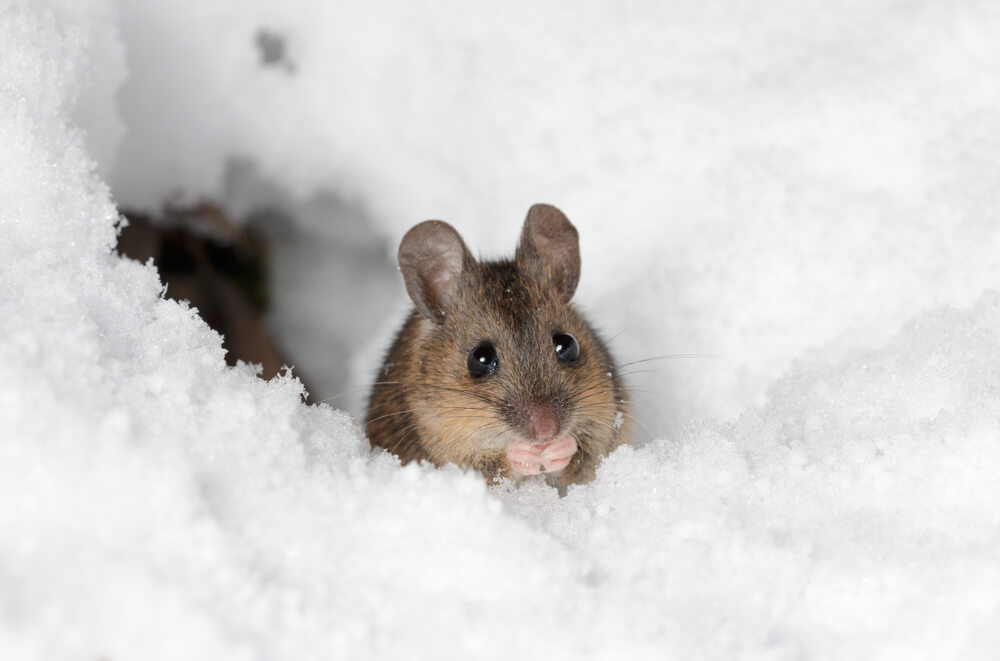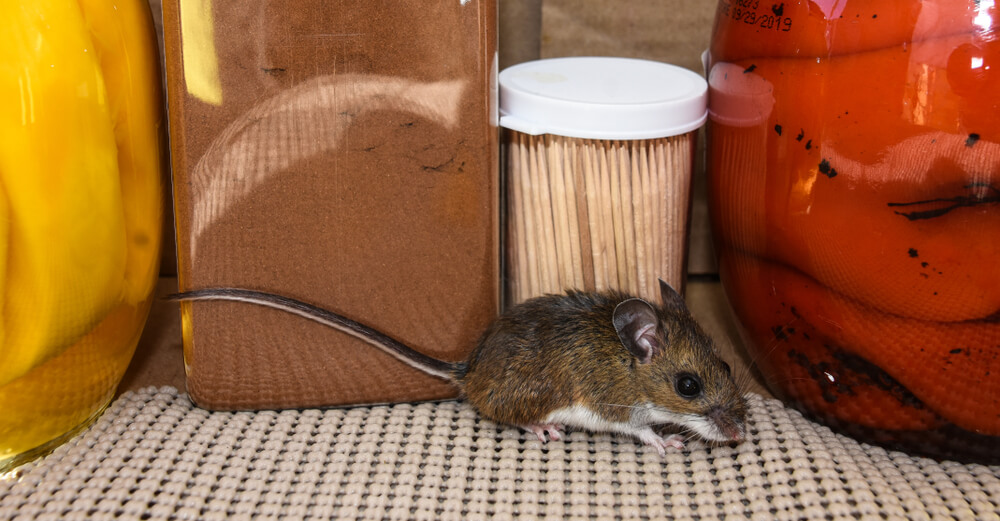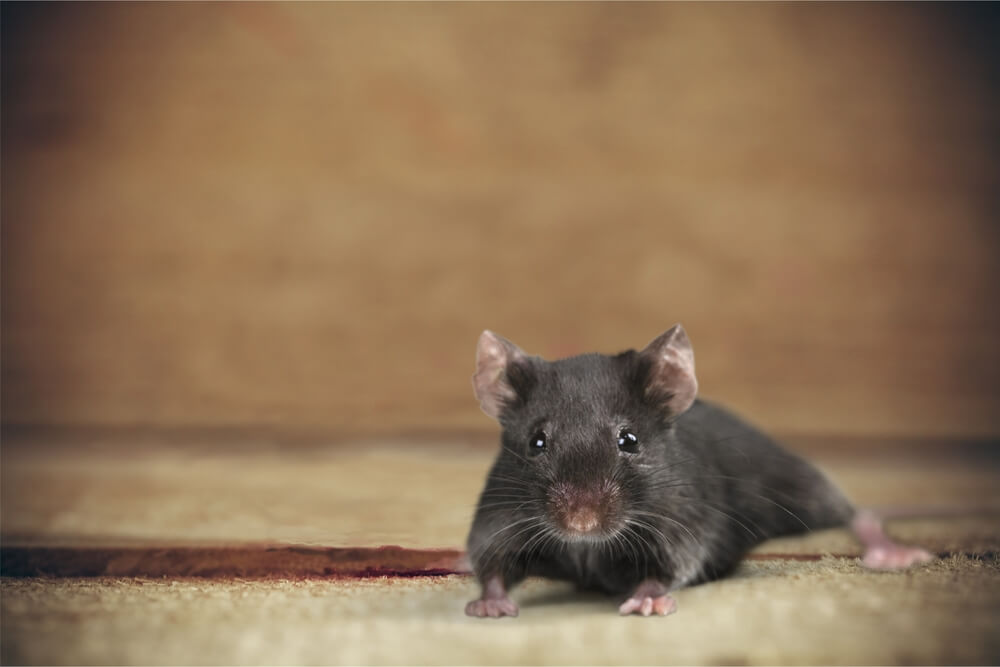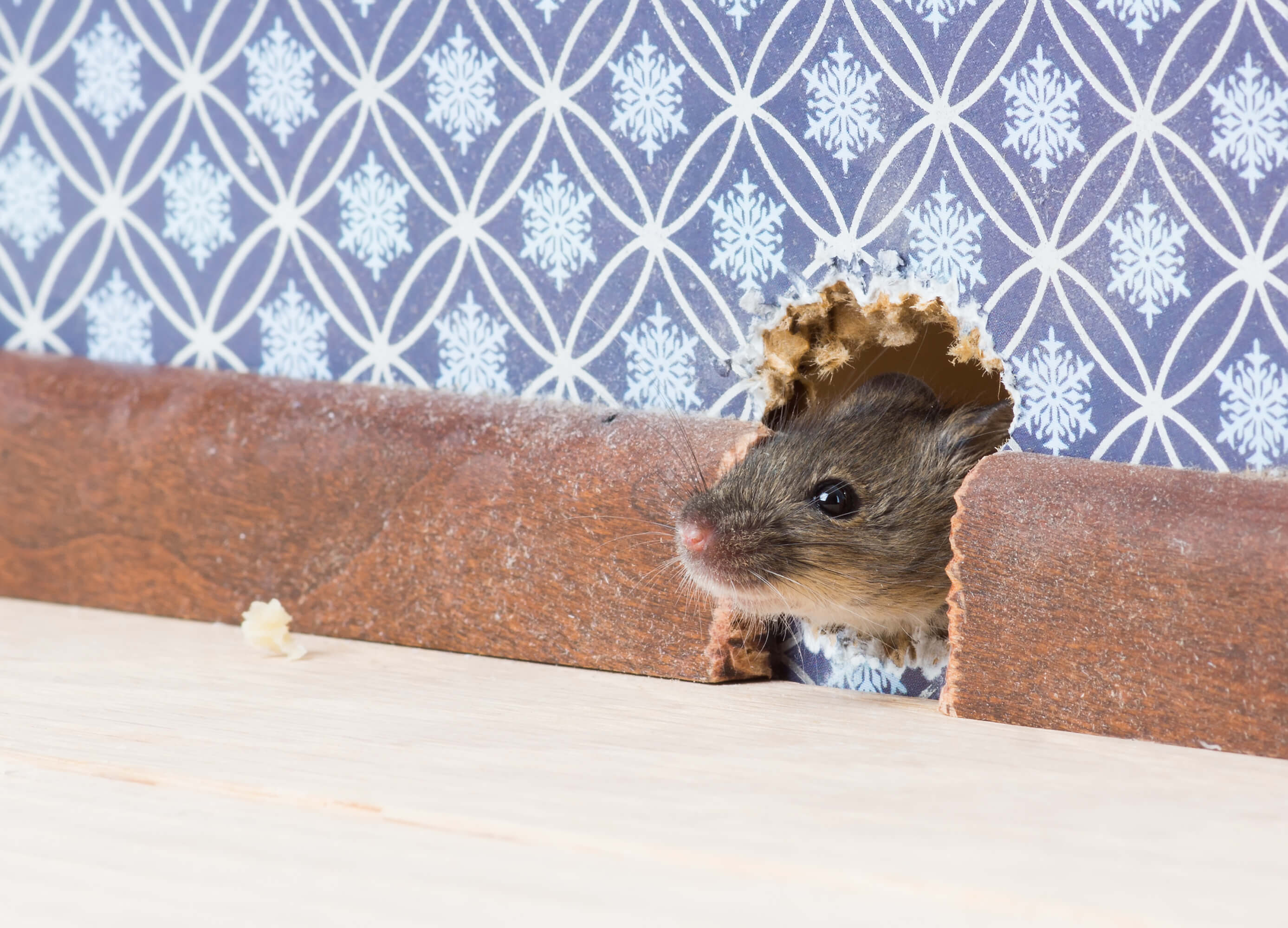Tips On Pest-Proofing Your Home For The New England Winter

The cold wintertime in New England can drive a wide range of pests into your home that are seeking shelter. Some of the most common winter pests in New England and the surrounding regions are rodents, carpenter ants, cockroaches, stink bugs, ladybugs, bed bugs, earwigs, and more. In this article, we’ll give you some tips on how you can prepare your home for the wintertime in order to prevent pest infestations from rodents, insects, and more! If you have any questions about pest prevention or are currently experiencing a problem with any kind of pest at your northeastern Massachusetts or southern New Hampshire home, please contact our team at Absolut Pest Control today for a free pest control estimate!
Seal Gaps & Cracks Around The Exterior Of Your Home
One of the best ways to prevent rodent and insect infestations in your home during the wintertime is to ensure that these pests can never enter the house in the first place! To do this, you should perform a thorough inspection of your house’s foundation, doors, windows, and siding. If you notice any cracks or gaps anywhere on the exterior of your home, you should be sure to seal them up in order to prevent pests from entering through them. Even if the crack or gap seems insignificant, they should still be sealed, as adult mice can squeeze through spaces that are only about the size of a dime. In order to seal off cracks and gaps, you can use screens, caulking, spray foam, steel wool, and more.
Landscaping Around Your House
Another great way to prevent pest infestations during the wintertime is to keep up with the landscaping around the exterior of your house. You should be sure that any tree branches around your house are trimmed back to at least 10 feet from your roof, as they can act as a bridge for insects and rodents. Additionally, piles of firewood should be placed at least 5 feet from your home’s walls, as pests living in these stacks could otherwise gain easier entry into your house. Finally, be sure to properly deal with the leaves that fall from the trees around your house, as pests often live and hide underneath debris. Rake your yard regularly to keep up with leaves and clean out your gutters!
Properly Dispose Of Garbage
One more way to prevent pest infestations this winter is to be vigilant about the way you store and dispose of your trash. Improper garbage storage is one of the most surefire ways to attract pests to your home, especially during the wintertime when pests’ typical food sources are more scarce. Be sure that your trash and recycling bins have tight fitting lids that are being utilized while the trash is still in your home and while it’s on the curb awaiting pickup, as rodents and small mammals like raccoons may try to break into your trash cans to find an easy meal. You should also be sure to regularly clean your trash cabinets in order to pick up any spills and crumbs that may be attracting ants, mice, and other pests!
Contact Absolut Pest Control!
If you have any questions about preventing pest infestations in the wintertime or are currently experiencing a pest problem at your Massachusetts or New Hampshire home, please contact our team at Absolut Pest Control! We provide home and business owners in the region with a wide range of pest removal & extermination services at affordable prices! Contact us today to get a free estimate by giving us a call at (978) 388-4589 or by filling out the contact form on our website!
What Diseases Do Mice Carry & Spread?

Mice are the most common rodents to enter residences and cause problems for the people that live there, making them a nuisance for homeowners throughout the United States. In addition to property damage that mice can cause by chewing through wood, drywall, wiring, and more, these little rodents can spread a wide range of diseases that can be harmful to you, your family, and your pets! In this article, we’ll talk about some of the diseases that mice carry and can spread to you when they are living in your home! If you are a Massachusetts or New Hampshire homeowner that is currently struggling with a rodent infestation, please contact our team at Absolut Pest Control today for a free extermination estimate!
Hantaviruses
One of the most common types of diseases that mice carry and spread are hantaviruses. Hantaviruses are a family of viruses that are spread primarily by rodents in the US, specifically by deer mice, white-footed mice, cotton rats, and rice rats. Hantaviruses are commonly spread to people when they are in the presence of rodent dropping and urine. Some common symptoms of hantaviruses include headaches, fevers, and muscle pain. If hantaviruses are left untreated, they can lead to other serious health problems.
Salmonellosis
Salmonellosis is a bacterial disease caused by the ingestion of a bacteria called salmonella. While salmonellosis is best known for being caused by eating raw chicken, it can also be caused by eating foods that have been contaminated by rodent feces. When mice get into the food storage in your home, your family is at risk for being exposed to salmonella. Symptoms of salmonellosis include diarrhea, abdominal pain, fever, and other flu-like symptoms.
Leptospirosis
Leptospirosis is a bacterial disease that is spread through the urine of infected animals, like mice. When a mouse that carries the leptospira bacteria urinates in your water or food supply, the disease can be spread to you. Leptospirosis symptoms include fevers, headaches, chills, vomiting, abdominal pains, and more.
Rat Bite Fever
Rat bite fever is a disease caused by consuming food or water that has been contaminated with streptobacillus moniliformis, a bacteria that is carried by mice, rats, and other rodents. As the name would suggest, rat bite fever can also be caused by bites or scratches from rodents that carry the disease. Rat bite fever typically causes a red, bumpy rash on the hands and feet.
Contact Absolut Pest Control
If you have any questions about mice, the diseases they carry, or believe that you have an infestation in your Massachusetts or New Hampshire home, please contact Absolut Pest Control! We provide various pest removal & extermination services at affordable prices throughout the region! Contact us today by giving us a call at (978) 388-4589 or by filling out the contact form on our website!
Tips On Keeping Rodents Away From Your Boston Area Home

If you’re having rat or other rodent problems at your Greater Boston area home or building, you’re not alone! According to WBUR, rat and rodent complaints are up 48% from 2019 to 2021, according to the city of Boston’s 311 data. For this reason, cities, towns, and homeowners are scrambling to find an effective solution for the rodent problems that are affecting their residents. In this article, we’ll go over some tips & tricks on how you can keep rodents away from your home this fall and winter!
Seal & Secure Your Garbage
One of the primary reasons that rats, mice, and other rodents will be on your property is that they have access to trash and food scraps. In order to prevent this, you should make sure that all your trash is stored in tightly sealed trash bins, whether it be on the curb or in your home. Additionally, you should be vigilant about eliminating other food sources that may attract rodents by storing food in air-tight containers, rodent-proofing your garden, picking up any fruit in your yard that has fallen from trees, and avoiding bird feeders.
Seal All Cracks Or Holes In Your Home
Did you know that rodents can squeeze through cracks and holes that are only the size of a dime? These minuscule holes & cracks are one of the primary ways that a rodent can enter your home. To prevent this, be sure to seal any cracks or holes in your home that are larger than a dime or gaps under doors that are greater than a quarter inch. Additionally, you should replace loose mortar, weather stripping, and damaged screens around the foundation of your home and windows. Sealing off your home to rodents is especially important during the fall & winter when rodents are looking for a warm place to shelter during the colder months!
Stay Clean & Organized
Mice, rats, and other rodents love a messy home! Be sure to clean surfaces regularly, especially in your kitchen and dining areas. Additionally, you should always store food in organized, sealed containers. Clutter in your home can allow rodents to move through your home undetected and may prevent you from noticing evidence of an infestation!
Contact Absolut Pest Control!
The best way to solve & prevent rodent infestations is to hire a local pest control professional! Absolut Pest Control provides the Greater Boston region with pest control & removal services for a wide variety of pests, including mice, rats, other rodents, insects, bats, birds, termites, small mammals, and much more! Give us a call today at (978) 388-4589 or fill out the contact form on our website, and we’ll get back to you as soon as possible!
3 Pests That Are Common In The Fall

As the colder weather approaches New England, critters and pests begin looking for a warm place to stay for the winter. This article will go over some common pests that people often have problems with in the fall months.
Mice
Like many rodents, mice begin searching for food and warmth when the cold New England weather starts in the fall. Because of this, your home may seem like an attractive place for them to shack up in the fall and winter. The best way to prevent this is by being proactive and making sure to seal off any potential entry points like tiny holes in doors or screens, air vents, gaps around plumbing, and any other small holes that lead into your house. You may also consider setting some preventative mouse traps so you can catch them if they do somehow make their way into your home.
Spiders
Fall is the time of year when some species of spiders begin laying their eggs before their life comes to an end, which can increase the population and bring the creepy crawlers into your home. While New England doesn’t have many dangerous spider species, it’s still a good idea to call a pest control professional if you have a spider infestation because they can deal with the problem effectively and make sure that the infestation does not persist. If you see spiders or spider webs outside your home, it’s important to remember that spiders are a crucial part of our ecosystem because they control the population of other bugs.
Beetles
You may begin to see beetles in your home in the fall months because this is around the time that these insects look for a safe place to hibernate for the winter. Some of the most common New England beetles that people have issues with at this time of year are ladybugs and stink bugs. These beetles often congregate around warm areas, so keep an eye out for them near any heat source. When you see beetles, an effective way to get rid of them is by vacuuming them up. Be sure to close off windows and holes in screens so these beetles don’t have an easy entry point into your home.
Contact Absolut Pest Control!
If you have any more questions about autumn pests or have a pest control problem in the greater Boston or southern New Hampshire area, don’t hesitate to contact us! Give us a call at (978) 388-4589, or fill out the contact form on our website!
Tips On Removing Rodents From Your Home

If you suspect, or know, that rodents have taken up residence in your home, Absolut Pest Control has some tips on what you can do to evict them! While the summer is still raging on, rodents like mice, rats, and squirrels will begin coming into homes soon to ensure they will be protected in the winter.
How Do I Know If There Are Rodents In My House?
If you think your home may have a rodent problem, there are a few tell-tale signs you can look for. One clear indicator that mice are in your home is by looking for their droppings. These droppings look like dark grains of rice, and can be found in basements, attics, crawl spaces, and anywhere else the rodents may be nesting out of your site. Another way to tell if a mouse or rodent is living in your home is by looking for their nests. These usually look like a small pile or gathering of scrap materials, like cloth, wood chips, paper, straw, or grass. Nests are generally only about 4 to 6 inches in diameter. Each female mouse can have a litter of 5 to 12 babies, and will not stop breeding until they are exterminated or removed from your home. One more way to recognize rodents in your home is by paying attention to scratching noises in your walls or ceilings. While older homes often make noises on their own, like the old saying of “a house settling”, it should be pretty easy to tell when the source of the noise is a pesky rodent.
How Can I Remove Rodents From My Home?
The easiest and most effective way to be sure your home is rodent-free once again is by calling a professional exterminator, like Absolut Pest Control. Rodents are some of the most common pest control problems that we see, so our team of experts is well versed in getting rid of them once and for all. Give our Emergency Hotline a call at (978) 388-4589 to have your rodent problem dealt with anytime, day or night. The next best way to deal with rodent problems is by using store bought traps. Your best bet is to lay down traps in areas that you suspect the rodents are often in. For example, in a basement or attic that you’ve found droppings or a nest in, a hole in the wall, or a pantry.
Contact Absolut Pest Control
For help with rodent problems or any other pest control issues in Massachusetts or southern New Hampshire, contact Absolut Pest Control by giving us a call at (978) 388-4589 or by filling out the contact form on our website!
How To Tell Between Rats & Mice

Whether you see it crawl across the floor or hear it in the walls, rodents can be a real problem. Not only do many people rightfully dislike rodents, but rodents can both carry disease, bite you and your pets, and destroy property. In New England, rodents usually migrate into homes before the winter begins. They look for homes that have easy entrance and exit points (potentially due to issues with siding, gutters, roofing, etc). They also look for homes that are warm and have access to food. Understanding what type of rodent you have can affect what pest control methods you attempt to get rid of the rodent.
Differences Between Rats & Mice
Often times the most common mistake made between rats and mice is between a small rat or an adult mouse. Many homeowners or business owners assume that the only key detail between rats and mice is their body size. And this can cause confusion as young rats can be smaller than adult mice. Pest control experts can use many different factors to tell the difference. Here are a few defining characteristics between rats and mice.
- Size: Although size can be confusing when dealing with rats and mice of different ages it is a defining characteristic in adult rodents. Rats can grow to 18 inches (or a foot and half) in length, while adult mice generally stop growing past 8 inches. If the rodent is larger than 8 inches, it is likely a rat.
- Tails: Mice generally have thin hairy tails. Rats on the other hand have thicker and hairless tails.
- Nose: A mouse’s head and nose is usually triangular in shape and comes to a point. Meanwhile, a rat has a more square or blunted nose shape.
- Fur Color: Although mice and rats can be grey or brown, black fur usually indicates a rat.
- Droppings: Many of these features require you to see the rodent. Which might not be possible. However, you can examine droppings to determine what type of rodent you have. Mice droppings usually have pointed ends and are about a quarter-inch long. Rat droppings have flat ends and are 3/4 inches long.
Contact Absolut Pest Control
Understanding what type of rodent is in your home can impact how you handle pest control. Many storebought mousetraps may be ineffective against rats or even larger mice. If you have tried to use traps and still deal with rodents, you should consider calling pest control. Absolut Pest Control serves homeowners throughout Massachusetts. Contact us today for more information.
Winter Pest Control Tips
It is December in New England. We have a few snowfalls, families are getting ready for the holiday season, and if you have made it this far without turning your heat on you are a true New Englander. As it continues to get colder and colder outside of your home, pests and especially rodents will be looking for any home to make their own for the next few months. Compared to finding shelter in the wilderness, your home or commercial property is very preferred. There is heat, access to food, and cable. Although they probably don’t care about that last one. Regardless, you will want to do whatever you can to keep pests and rodents from entering your home and setting up camp.
Preventing Mice & Rats From Eating Your Food This Winter
The goal of preventing rodents from entering your home this winter is to make sure you do whatever you can to not make your home appealing to them in the first place. That doesn’t mean not having your heat on. Instead, you need to do whatever you can to keep food out of their hands. First off we recommend storing all of your food in airtight plastic containers. Trash should not be left uncovered and should be taken out frequently to avoid attracting rats, mice, or raccoons. And of course, you should periodically clean your kitchen and bedrooms with vacuum cleaners to collect food crumbs and debris.
Schedule A Winter Pest Control Inspection
Another important tactic for winter pest control is to have professionals survey your property. If you have had issues with rodents in the past, you should hire a pest control team to get to the bottom of how they are getting into your home. Pest Control experts know where to look and what to look for to find entry points. With some simple carpentry, you can limit the ease of entrance for pests coming into your home.
What To Do When You See Pests In Your Home
If there is a rodent in your home, do not rely on store-bought traps. Many of those traps can be ineffective and cleaning up after them can be a hassle. Instead, hire a pest control team to remove the rodents and find the issues that led to the infestation in the first place. Simply getting rid of one rodent at a time is not an effective way to deal with rodents longterm.
Contact Absolut Pest Control
For homes and businesses throughout Eastern Massachusetts, there is one name in Pest Control everyone trusts: Absolut Pest Control. Give us a call to discuss a pest control inspection or the removal of a rodent or other issue.
Pest Control Tips For Mice and Rodents This Fall
It’s fall, which means the return of pumpkin-spiced everything, raking leaves, and Halloween. Many families and businesses will decorate their homes and offices with fake spiders, rats, and other scary animals. And as long as they are plastic, they are fine. But if you notice pests that aren’t decorations or pets in your home, you are going to want to get rid of them. Fall is a key point in pest control because it is around this time that large pests like rodents try to move into homes for shelter. Rodents carry disease and can destroy your property which is why homeowners and business owners are so passionate about getting rid of them. Here are a few tips to keep rodents out of your home this fall.
Take Preventative Actions for Rodent Control
The first thing you should do is take preventative action. When you have a weekend of a few days to work on your home, you will want to inspect the home both inside and out to find entrances for rodents. Check around windows and doors for any gaps. Use weatherstripping to cover these areas. Next, you will want to inspect the area around your siding. If you have vinyl siding or wood siding you need to check for cracks and other damage that may have been caused due to high winds and storms. You will need to seal any cracks with caulk to minimize entry points for pests. Not only will this protect your home from rodents, but it will also protect your home from insects and will decrease your heating bill by stopping warm air from escaping.
Know The Signs of Mice & Rats
If rodents enter your home you will want to know it right away before they cause extensive damage. There are many signs of rodents you may notice before you actually see one run across the floor. Be on the lookout for mouse droppings, gnawed holes, shredded paper, or sounds of mice in the walls and ceiling. If you think you have a rodent in your home, the next step is to either get traps or hire a pest control expert.
Should You Get Pest Control or Traps?
Although traps are often less expensive than hiring pest control, any homeowner or business owner knows that not all traps work. Traps that used to work can also fail to work in the future as rodents adapt over time. If your traps aren’t working, the best way to get rid of a rodent problem is to hire the professionals.
Contact Absolut Pest Control
If you need pest control services, you need to call Absolute Pest Control. Our team works throughout Massachusetts to provide pest control solutions to commercial and residential clients. Contact us online to set up an appointment.
3 Different Methods To Get Rid Of Rodents
It starts with the sounds of scuttering feet in the walls and ceiling. And a black or brown blur of speed across the floor when you go to the bathroom at night. Suddenly, it isn’t a question of “if you have mice,” but “how many mice are there,” and “can mice climb into beds”? (Yes, yes they can). Now you have mice in your apartment, eating your food, trashing your furniture, and not paying rent. The most important question becomes “how do you get rid of the mice”? There are thousands of traps, superstitions, old wive’s tales, and “how to get rid of mice” blogs on the internet (including this one).
All-Natural & Humane Methods
The myth that the only way to take care of pests is to exterminate them is very pervasive. In reality, a lot of humane methods can be effective for small pest control jobs. If you are trying to persuade one or two mice to try the apartment down the street instead, there are a few ways you can accomplish this. If you want to pursue the humane method, start by being proactive. Limit entry points by block holes, keep your food stored in airtight containers, and use natural repellents to keep away mice. Peppermint has been found to be the most effective scent deterrent.
If you already have a mouse, do your research on non-lethal traps. There are many reasons to avoid using rat poison beyond just wanting to be humane, especially if you have pets and children. Look for traps that provide minimal harm to mice and make sure to check your traps regularly to avoid starving a mouse to death.
Traditional Traps
Of course, you may decide to use more traditional traps. In some cases, there are mouse traps that are designed to kill a mouse while minimizing potential suffering. Depending on your conscious, it might be worth investing in these traps. Cats provide a natural deterrent to mice, both because their natural smell is something rodents have evolved to fear, and because cats have a natural ability to dispose of mice (although don’t be surprised if your cat parades around their kill like a trophy).
When to Hire a Professional
In fairness, we are a bit biased here (this a professional pest control blog after all). But seriously, there are two times you absolutely need to call professional help. First, if nothing else is working and you have tried all the DIY methods. Second, if the word infestation is the best description of your situation. Whether your home or property needs to be fumigated or there is a single rodent that is the bane of your existence, it helps to get professionals involved. Not only can professional pest controllers remove mice, rats, bats, and other problematic pests, professionals can find and assess root problems. Pest controllers can give professional recommendations on how to keep pests out. From better food storage to needed construction to limit entry points.
If you have a mouse or other pest control problem, call us at Absolut Pest Control. We also provide evaluations of your property to help prevent any future infestations.
Ward Off Pests with Some Spring Cleaning Tips
While spring has technically arrived, the weather is still quite wintery. But, the weather conditions will soon improve and that means we’re getting ever closer to the big spring clean up once winter makes its full exit. While some may roll their eyes or groan about spring cleaning, it doesn’t change the fact that it’s highly effective. After all, winter can be a brutal season, especially on the east coast. Taking stock of your home in the spring can help you spot areas in dire need of attention, areas that if left ignored could allow pests into your home. If you want to maintain a pest free home this spring, give the following areas of your home some love during spring clean-up
Bathroom
One should not have to worry about pests in their bathroom, period. But, if you have moisture issues in your bathroom, you may encounter silverfish or cockroaches, both spring pests, during your morning shower. Since both pests are attracted to moisture, be sure to eliminate open sources of water in the bathroom. Be sure to clean out your medicine cabinet, inspect the bathroom for any leaking moisture from pipes or faucets, and wash your shower curtain and liner.
Kitchen
Nicer weather brings the ants right on out. The first place they’re likely going to invade if they get into your home is your kitchen since it provides ample access to both food and water sources. They will crawl throughout your kitchen in search of crumbs, residue from liquid spills, and overripe fruit left sitting out on the counter. Keeping a consistently clean kitchen is tantamount to keeping pests at a minimum, but there are a few more things you can do to help. Clean out your cabinets and remove old food items, like spices and flour. Those ingredients can attract beetles and ants. Once you’ve cleaned out your cabinets, wipe down the insides for good measure. You can also pull out your appliances and clean behind them, as you’d be amazed at how much is actually back there. Giving your kitchen a good scrub down isn’t a bad idea, either.
Basement
Your basement can be a popular place for spiders and rodents to camp out in, especially because there are corners and clutter they can hide amongst. Going through items in your basement and getting rid of things you don’t need can negate this, as it will provide fewer hiding places. When storing items, don’t use cardboard boxes because they can wear down over time and allow pests access to their contents. Instead, use sturdy plastic bins with secure lids. If you happen to notice any cracks or crevices that give you pause, seal them up with caulk to provide pests with one less access area to your home. You’d be surprised at just how small an opening has to be for critters to get through.
Spring cleaning shouldn’t just be a quick clean up. Spring cleaning doesn’t only get your house ready for spring either, but for summer too. By giving your home a solid inspection, particularly in the areas listed above, you’ll be ensuring strong pest protection for months to come. If you begin experiencing a persistent issue, please get in touch with us. You can reach us at 978-388-4589 or by filling out an online contact form.
